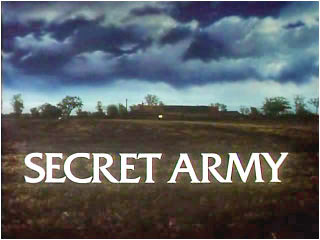For anyone who may have cast an inquisitive or nostalgic eye over my review for the TV show Colditz last September, this piece will probably come as no surprise. I did, after all, say it was highly likely I would bring this show up again. Classic British TV pretty much sums Secret Army up.
It was created by Gerard Glaister (that’s the link with Colditz) jointly by the BBC and the Belgian BRT (now VRT) and it originally aired between September ’77 and December ’79 just about at the time my parents ushered me off to bed. I can well remember being awed by – and a little bit afraid of – the atmospheric and rather bleak opening titles and that wonderful, almost Rachmaninoff-like theme tune which does such a fine job of setting the tone for the show. Alan Jeapes, whose other credits include Eastenders, won a BAFTA for his efforts with these opening (and presumably closing) titles while Robert Farnon, who also wrote the music for more than forty films including Captain Horatio Hornblower R.N. gave us the theme tune.
Secret Army is a story about a fictional resistance movement in Belgium during the Second World War called ‘Lifeline’. Loosely based on the real life ‘Comet line’ which helped allied soldiers and airmen return to Britain via France and Spain and on through Gibraltar, there is a realism to the show that makes it totally engaging. Indeed, Glaister, who was an RAF pilot during the war and would later be awarded the Distinguished Flying Cross for his services as a photo reconnaissance pilot in the Western Desert, drew on his experiences as inspiration for the series.
The Café Candide is the main setting of the show and it is run by Albert Foiret (Bernard Hepton) and acts as the hub for the characters. It is the Rovers Return (apologies for another soap reference) of the show, where meetings take place and information is passed that drives the plots. The café is situated somewhere around Brussels where the locals as well as the occupying Nazi forces frequent the place while Albert covertly helps Lisa Colbert (Jan Francis) – a doctor’s assistant by day and a leader of the resistance by night – run ‘Lifeline’. Other members of this ‘secret army’ abound such as the waitress Natalie (Juliet Hammond-Hill) and Albert’s mistress Monique (Angela Richards). If this scenario is beginning to ring bells, then those bells are most probably chiming the theme tune to the sitcom ‘Allo ‘Allo!, which was a hugely popular but dare I say it, rather idiotic, parody of Secret Army, which ran from 1982-92.
The rest of the characters are either locals, fellow collaborators like S.O.E. Officer Flight Lieutenant John Curtis (Christopher Neame), Nazis or allied officers trying to get back to Blighty and it’s the job of the resistance to make that happen. Of course, there would be no tension if there wasn’t the opposing force and therefore, it’s the job of Major Brandt (Michael Culver) and Sturmbannführer Ludwig Kessler (Clifford Rose) to capture every single evader, unearth every safe-house and to close down the evasion line. And therein lies the game of cat and mouse, the show’s recipe for excitement, as one side always tries to gain the upper hand on the other. But it’s a game that costs lives.
I can’t tell you what happens to the characters as the show progresses through its 43 episodes (3 seasons) because I haven’t seen them all yet. But what I have seen has been enough to make me cross my fingers and hope that it gets a rerun on TV soon. There’s nothing gratuitous in the writing, as there is with many contemporary shows; it’s just damn fine storytelling inspired by real-life events. In fact, according to the trivia on IMDB, every one of the scripts were based on real events and thoroughly researched to the point that on more than one occasion, the BBC had to reject a script on the basis that it was deemed too accurate and therefore potentially upsetting to audiences or too politically sensitive. How’s that for reality TV.

